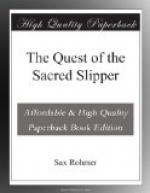I had work to do in plenty, but I could not apply my mind to it; and now, although the obvious and sensible thing was to go about my business, I wandered on aimlessly, my brain employed with a hundred idle conjectures and the query, “Where have I seen The Stetson Man?” seeming to beat, like a tattoo, in my brain. There was something magnetic about the accursed slipper, for without knowing by what route I had arrived there, I found myself in Great Orchard Street and close under the walls of the British Antiquarian Museum. Then I was effectually aroused from my reverie.
Two men, both tall, stood in the shadow of a doorway on the Opposite side of the street, staring intently up at the Museum windows. It was a tropically hot afternoon and they stood in deepest shadow. No one else was in Orchard Street—that odd little backwater—at the time, and they stood gazing upward intently and gave me not even a passing glance.
But I knew one for the Oriental visitor of the morning, and despite broad noonday and the hum of busy London about me, my blood seemed to turn to water. I stood rooted to the spot, held there by a most surprising horror.
For the gray-bearded figure of the other watcher was one I could never forget; its benignity was associated with the most horrible hours of my life, with deeds so dreadful that recollection to this day sometimes breaks my sleep, arousing me in the still watches, bathed in a cold sweat of fear.
It was Hassan of Aleppo!
If he saw me, if either of them saw me, I cannot say. What I should have done, what I might have done it is useless to speak of here —for I did nothing. Inert, thralled by the presence of that eerie, dreadful being, I watched them leave the shadow of the doorway and pace slowly on with their dignified Eastern gait.
Then, knowing how I had failed in my plain duty to my fellow-men —how, finding a serpent in my path, I had hesitated to crush it, had weakly succumbed to its uncanny fascination—I made my way round to the door of the Museum.
CHAPTER XIII
THE WHITE BEAM
That night the deviltry began. Mr. Mostyn found himself wholly unable to sleep. Many relics have curious histories, and the experienced archaeologist becomes callous to that uncanniness which seems to attach to some gruesome curios. But the slipper of the Prophet was different. No mere ghostly menace threatened its holders; an avenging scimitar followed those who came in contact with it; gruesome tragedies, mutilations, murders, had marked its progress throughout.
The night was still—as still as a London night can be; for there is always a vague murmuring in the metropolis as though the sleeping city breathed gently and sometimes stirred in its sleep.
Then, distinct amid these usual nocturnal noises, rose another, unaccountable sound, a muffled crash followed by a musical tinkling.




